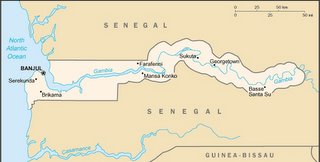 Interesting article because it gives us a look at another place and how they work at the same things we do so many miles away.
Interesting article because it gives us a look at another place and how they work at the same things we do so many miles away.The Daily Observer
Observer MD Urges Greater Education Access
Written by DO
Monday, 16 January 2006
Dr Saja Taal, a senior lecturer at the University of The Gambia, who also doubles as the Managing Director of the Observer Company (Gambia) Limited, has observed that there are not enough senior secondary schools in the country to meet the growing demand for secondary school education.
Speaking last Friday at a one-day interactive workshop on educational tourism, jointly organised by Gam-World Education Link, the Movement for Positive Action and Change (MPAc) and the Association for Responsible Tourism (Art) of the University of The Gambia at the University Auditorium, School of Nursing and Midwifery in Banjul, the erudite don said: "Despite the proliferation of senior secondary schools in the country, a large number of students from the upper basic schools are still not absorbed in the secondary schools."
He therefore called for the establishment of more senior secondary schools across the country to take in the upper basic school leavers.
Dr Taal's predilection for the controversial showed itself in his class analysis of educational access in the country, as he contended that a considerable number of students flock to the Greater Banjul Area (GBA) for secondary school education because that is where most of the qualified teachers are found.
To redress this lopsidedness, he said, the Department of State for Education (DoSE) has introduced hardship allowance for teachers who choose to work in the provinces.
Dr Taal noted that the same imbalance is observable among female teachers in that most of them prefer to work in the GBA.
A key impediment to universal access to education in the country, according to him, is the widely held belief that you need not be educated to be wealthy. He pointed out that most parents accordingly regard education as a sheer waste of time, believing that the time spent in school could be more productively used in making money by doing something else.
That notwithstanding, Dr Taal opined that more enlightenment campaigns on the value of education as a defence and emancipation from the shackles of ignorance ought to be carried out with greater vigour throughout the country.
Dr Taal's views set the tone for the workshop and were lapped up by an appreciative audience, especially by Mrs Lisong Bah of the Christian Children's Fund (CCF), who openly admitted that Dr Taal had made her presentation a lot easier for her.
Speaking on early childhood education in The Gambia, Mrs Bah identified shortage of trained personnel, the dichotomy between the curriculum of the lower basic school and that of the early child development centres, and lack of funds as the major drawbacks of early childhood education in the country.
According to her, early childhood education takes the form of home-based care, centre-based care, community-based care and parenting education.
She disclosed that CCF provides sensitisation and training for targeted caregivers with emphasis on holistic child development and the integrated approach.
Last Updated ( Monday, 16 January 2006 )

1 comment:
judy; i'm pleased to see this article (and others as well on your blog); i think it's important for us to begin to encounter and try to understand childrens differing experiences of early education or not!
Post a Comment